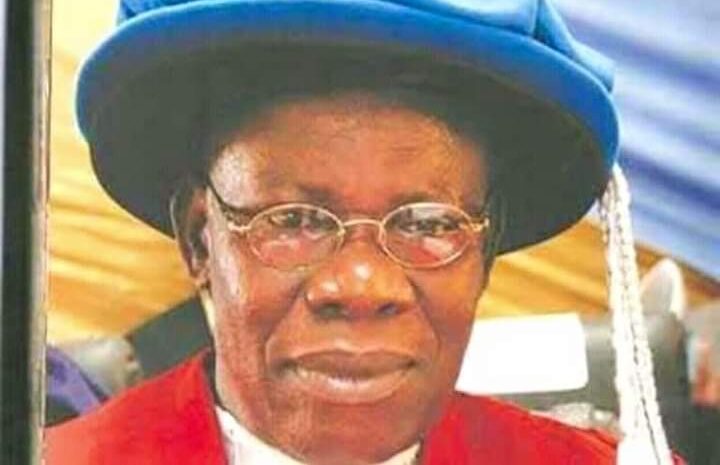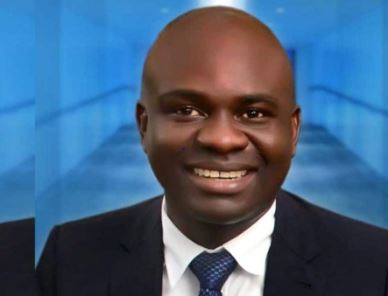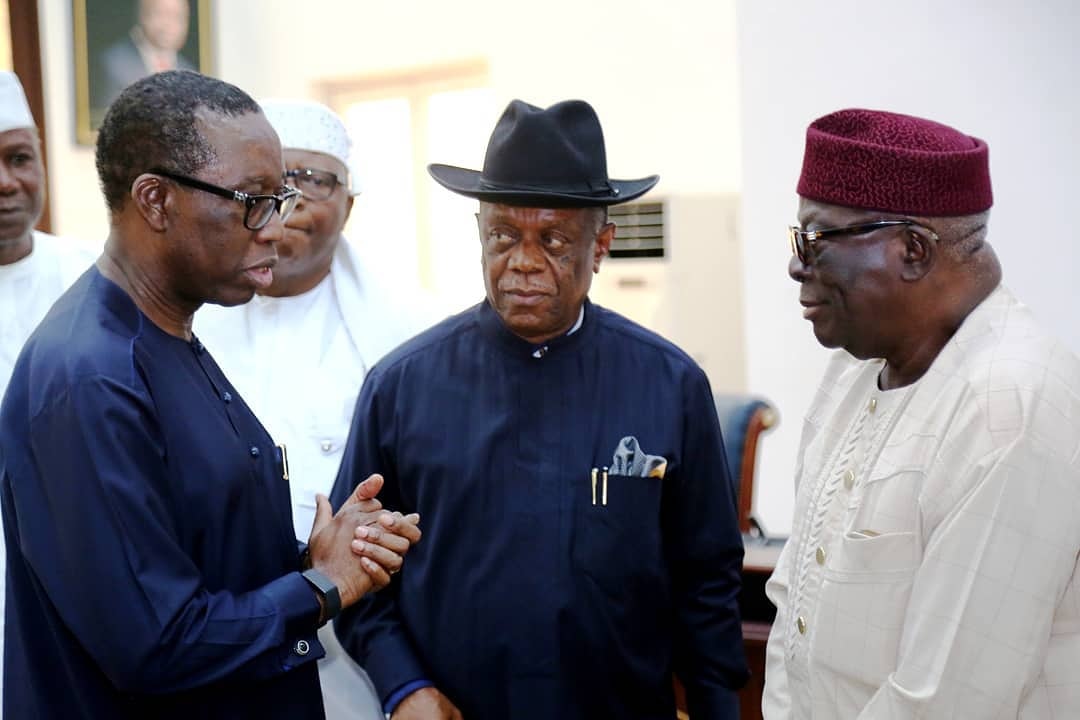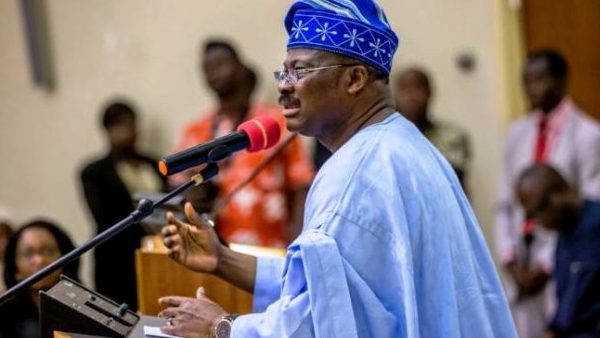By Ogheneochuko E. Arodovwe (M.A. Unilag)
Days are days but some days hold more significance than others. This day, the 22nd of November is very special to the Darah dynasty because on it 73 years ago, a baby was born whose life-time voyage and achievements would transform the status of the family from the obscurity and anonimity of a household in the southernmost stretch of one of the Owawha island communities of the Ughievwen people of Urhobo to a national and global brand that would become a popular name in Esaba, Ughievwen, Udu, Urhobo, Delta State, the Niger Delta, South West Nigeria, Africa and the world.
Godini G. Darah’s achievements were built on his rare academic prowess which began with his admission on scholarship to St Vincent’s Grammar School Okwagbe in 1963, thanks to Chief T.E.A. Salubi’s approval of the school on his first day of resumption of office as Education Commissioner under the hurriedly asembled interim government in the Western Region led by Dr Moses Majekodunmi. But for Salubi’s whimsical intervention, the world would never have heard of G.G. Darah. He had been home for two years after primary school because his parents could not raise the amount of money required for his secondary education. He sat for and passed the scholarship examination into the newly approved College. He was a pioneer student of the college in 1963. His leadership qualities were immediately spotted and was made senior prefect from Form 1 to 5, before he left for Federal Government College Warri for his A levels in 1968.
Darah was admitted to the prestigious University of Ibadan in 1970. The period is significant because of the global ideological antagonism between the capitalist west and socialist east at the time fondly described as the ‘Cold War’. The first generation of post-colonial African thinkers at the time were largely influenced by the socialist thoughts of Karl Marx and Frederick Engels, and thus adopted an African variant of socialism. Kwame Nkrumah of Ghana, Julius Nyerere of Tanzania and Leopold Senghor of Senegal led the path. Nigeria was somewhat indifferent in these ideological directions. (She still is till date unfortunately).
However the University of Ibadan provided the avenue for productive intellectual and dialectical interactions on these matters. Darah learnt quickly from his teachers such as Omafume Onoge, Eskor Toyo, Ola Oni, et. al. and soon became a recognised Marxist revolutionary teacher in Ile-Ife with other colleagues like Oladipo Fashina and Biodun Jeyifo. G.G Darah was on the Nigeria scholar delegation to London in 1983 to mark the 100th year anniversary of Karl Marx’s death. (Marx had lived from 1818-1883).
G.G Darah while a lecturer at University of Ife (now OAU) was at different times Secretary and branch President of the Academic Staff Union of Universities (ASUU). For his “troubles” and radicalism, the Buhari military regime had him arrested and imprisoned in an underground facility in Dodan Barracks, Lagos.
Timely press conferences and media pressures forced the government to get him released before any damage had been done to his health in that terribly sordid condition in the Nigerian prison.
Darah’s insatiable ambition for broader avenues to spread his ideas drove him into mainstream media where he was Chairman, Editorial Board of The Daily Times and The Guardian from 1985 to 2001. At the Guardian, he maintained a weekly column where he contributed over 400 articles. He was a consistent advocate for the end of military rule, the restoration of democratic government, true federalism, and economic and environmental justice for the Niger Delta peoples.
Darah was a close associate of the undisputed winner of the June 12, 1993 presidential election Chief M.K.O Abiola and his wife Kudirat Abiola. He consulted for the late chief in his Reparations agenda for former slave victims, and flew with him to Goree, Senegal severally on research trips. Darah was a likely candidate for ministerial appointment had Chief Abiola attained his dream of being the president of Nigeria. Unfortunately, General IBB had other plans.
Darah was also a close associate of Chief Frank Kokori, arguably the most influential comrade Nigeria has ever known after the unbeatable Chief Micheal Imoudu.
Darah’s return to the classroom at Delta State University, Abraka in 2000 was both a loss and a gain. It was a loss to the media world in Nigeria especially his immediate constituency, The Guardian, where he and his revolutionary colleagues had used the power of the pen to influence policies of government, shapened public opinion and in some cases dethroned maximum dictatorships and despotic governments in Nigeria and other parts of Africa. Unfortunately, Darah’s generation left shoes too big to fill in the Nigerian print media up to this day.
But it was a gain to his Urhobo people and Delta State, and to the students who were lucky to have been taught by such an intellectual Iroko at Delsu. Darah had spent over three decades in western Nigeria as student, lecturer, activist, union leader, media executive and international correspondent. He had travelled widely and had, by some evaluation, attained the peak of his career. He was friends with virtually everyone that mattered in society at the time across various walks of life, and the complementary social life that Lagos afforded could have easily made anyone forget about one’s roots.
But not so for Darah. Although he could speak the language fluently and his Yoruba friends would have readily ‘adopted’ him as one of their own, he, like his mentor J.P Clark, never forgot his roots. For one thing, Darah’s doctoral research in far away Ibadan had been on the Udje dance tradition of his Urhobo people. J.P Clark had pioneered the academic documentation of the tradition with a published paper in 1968, which Darah had read and which influenced his doctoral research interest in it. And so a divorcement with his Urhobo people whom he loved passionately could not have been possible. He had always maintained a close communication line with the home front all the while he was in Lagos. For instance, Darah literally relocated to Warri and Sapele during the Idjerhe Fire holocaust of 1998 to ensure proper media coverage of the event, maximal compensation for the victims and commensurate sanctions for the oil companies with their government collaborators for the environmental desecration they had caused.
And so it is hardly surprising that when he decided to get back to the classroom, he esteemed the pleasure of impacting his people in the modest town of Abraka greater riches than the fleeting glamour and bustle of city life in Lagos and Ibadan.
He fought hard with others of similar passion at Delsu to develop and introduce the B.A in Urhobo language programme that has become one of the fastest growing departments in Delsu today. He has supervised several PhD theses on Urhobo themes, with the former students now senior lecturers. Most of the students he taught, mentored and in some cases secured openings for in several universities now consult with him almost on weekly basis on various research themes.
But Darah’s vast experience, sagacity and ideological depth did not go unnoticed by the then government of Delta State led by Chief James Ibori. When the Governor thought to set up a think-tank of men and women of wisdom to provide a comprehensive Development vision for the state, Darah was one of the men on the list, with the indefatigable Deacon Gamaliel Onosode as head. More significantly, when Chief Ibori decided to consistently pursue the resource control mission and true federalism alongside his compatriots from the other South South states, he was advised to get Prof Darah in his team if he was to make a success of the vision. This he did by appointing him communication consultant to the government. The facts about how that administration awed the federal government at the time with intelligent arguments based on facts and figures is common history. The federal government had no choice than to raise the derivation to 13% after initially proving stubborn. Through out the period, Darah and Ibori with his colleagues such as Alameiseigha, Donald Duke, Victor Attah, Igbinedion, gave sleepless nights to the Abuja oppressors. Darah was the intellectual arrowhead of that crusade from 2003 to 2007. He gave speeches in Lagos, Abuja, Port Harcourt, South Africa, London, Carlifornia, Georgia, Texas, Germany, etc in the mission of actualising a stable equitable Nigerian society.
As a deserved compliment, Darah is arguably the most sought-after Nigerian intellectual in public discourses in matters of governance, social justice, security and national development in the last two decades. To substantiate, Darah has given over a hundred public lectures, keynote addresses, reviews, etc in the last twenty years. His public tours has seen him travel to the 194 countries recognised by the United Nations except 4! He is perhaps the most widely travelled intellectual of the Niger Delta living today. Prof is a perfect example of the conciliation between “town and gown”, a practice that must be encouraged in our educational system in Nigeria.
Prof may be 73 today but he is still as passionate, ambitious, cerebrally robust and optimistic of a better life for our people as he has always been, if only the government can listen and apply scientifically tested principles to governance.
Prof still teaches but now includes consultancy, mentorship and community leadership to his tasks as the years add up. His home is always a beehive of activities from people seeking one help or the other on diverse matters covering Urhobo issues, community matters, cultural clarifications, academic matters, Niger Delta, Nigeria and international politics. He also travels often to attend to pressing national issues. He is also seen often on zoom conferences sharing ideas with participants. At 73, Prof has maintained an incredible work ethic that sees him sit up at 5am daily studying and writing till late in the afternoon. He credits his professional life in the media with that discipline. Prof is at present collating several of the speeches he produced during his most fertile period into books of several volumes that should soon be available for the reading public. He thinks that posterity would benefit immensely from the ideas. Prof’s bosom friend and popular author Mr Odia Ofiemun has been a constant motivator of Prof to put his uncommon ideas and vast experiences into books for the benefit of the present and future generation.
As he marks the beginning of another year today, we, his academic children and mentees can only wish him sound health, Ufuoma, Aridon, Omaosasa, Efe and Otovwe.
Congratulations sir!
Ogheneochuko E. Arodovwe is a Research Assistant to Prof Darah.










